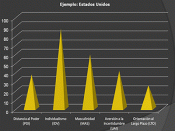For any international organization, it is of enormous significance to understand cultural differences and make good use of them in the global context. National culture may be thought of as the values, beliefs, perceptual orientations, and norms typical of the members of a particular society (Trompenaars, 1997). Management techniques inconsistent with national culture can lead to conflict between multinational corporations (MNCs) and its employees and, perhaps the broader society. Comparative studies of national culture across a large number of countries are limited because of the significant costs associated with data collection. A study by Geert Hofstede, using data collected in around 60 countries in the late 1970s, remains influential despite controversy over his methodology and interpretation of the findings. Through insight into a culture perspective, the essay analyzes the role and impact of culture on International Human Resource Management (IHRM). It starts by comparing the cultural dimensions of Australia and China, and then deals with the methodological and limitations of Hofstede's research process, as well as the application of the findings to the human resource management function.
Hofstede's model of cultural traits identifies five dimensions of culture that assist to explain why people from various cultures behave the way they do. Through the comparison of Chinese and Australian culture using the cross-cultural dimensions: power distance (PDI), uncertainty avoidance (UAI), masculinity (MAS), individualism (IDV), and long-term orientation (LTO); an insightful view into the differences and similarities of the cultures can be obtained. By exploring these differences and similarities from an IHR perspective, strategies aimed at achieving organizational goals can be better achieved.
The first national culture dimension to be identified is the measurement of power distance. In countries with high power distance like China (PDI of 80), individuals are more likely to accept differences in authority or inequality.


